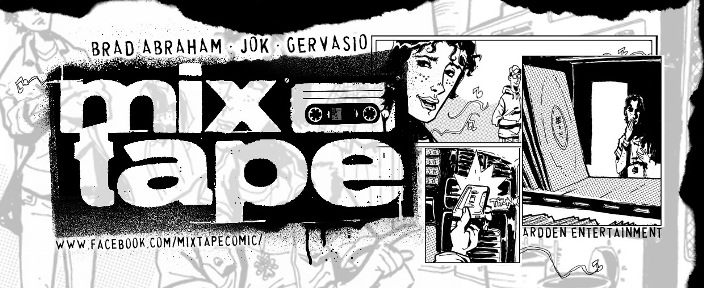First bit of business; new publication dates for MIXTAPE (print and iTunes versions) are forthcoming. We just need to work out a few details, to avoid announcing a new date and having that be untrue. But you can look to the end of March-beginning of April for release in one, if not both formats. Again, the announcement will drop here.
If you’re frustrated by the delay, well, join the club, and be thankful you’re not me, who’s frustration burns like the brightest star in the heavenly firmament (i.e. the Sun — seriously, try and stare at it and you’ll share my pain). Delays happen, and they’re not through any malicious intent on the part of anybody, but they do monkey with the works; to wit, some reviews are being held until we get the release sorted out.
On the positive side, the delay has allowed us the additional time to get the word out about the book, and the good news in that is that we’ll be getting much more media exposure, on the web, and radio, and even TV sometime in May. media have actually been contacting me about the book, which is a great sign that word is starting to get out about Mixtape.
So for every negative, there’s a positive, and the latest came in the form of a review that did slip out onto the web from Playback.Stl. Click the link to read it. It was a positive one, and quite in-depth, but one part really lept out at me:
“Abraham’s teens are equipped with large dashes of stupid and, well, frankly, they’re not very fun … which means that they’re telling stories so eerily similar to actual teenagers that it’s frightening.”
If you look at movies or TV or, yes, comic books focusing on teens, you’re always forced to choose between one extreme or the other. The first is wish-fulfilment; characters who always know what to say and how to say it, how to act and so on The teens/twenty-somethings of the Scott Pilgrim universe fit that category — they have the same foibles as real people, albeit with kung-fu and video-game powers. It’s a fantasy, but an appealing one (and the fact the Scott Pilgrim saga unfolds against the backdrop of my old hometown gives it a particular resonance for me). If you look at “teen” based TV or movies — the cool teens (i.e. the ones we like, not the snobby jerks) have cool parents and hip friends and are, like, so above the High School shenanegans it’s funny (see Easy A and Ferris Bueller). Who wouldn’t want to be that cool, that together, that much a winner? It’s a fantasy, but an appealing one, and lord knows we could all use a little more in our lives.
The other type are the “slice of life” ones — the “After School Special” approach where “real teens ” (written by 40-something men and women) deal with such burning issues as suicide, alcoholism, drunk driving, drugs, bullying, peer pressure, divorce, and a host of other traumas. These stories are frequently traumatic bordering on horrific, but all end on the same note; with survivors, having learned the lesson of the day, live to struggle onward. John Hughes specialized in stories like this (and more than one reviewer has compared the Mixtape sensibility to that of The Breakfast Club and Sixteen Candles, filtered through an alt-rock haze). There’ve been some queries about movie and TV rights for Mixtape, though I can’t see Mixtape working in either format the way it does in comics. Good luck spinning a weekly series about teens just hanging out and shooting the shit about nothing in particular; in TV you need conflict and story arcs and crises to deal with, and while we deal with those in real life, Mixtape (the comic) feels more separated from those Big Moments. They happen, but they happen off-screen, not exposed for everyone to watch.
Mixtape aspires to be neither Ferris Bueller or The Breakfast Club.
It aspires to be “slice of life” but life as it’s usually lived. The day-to-day grind of getting through intact. There is drama and conflict, because it would be deadly dull without that conflict, but Mixtape is, and has always been, more about what happens after the party is over, after the diplomas have been awarded. That’s not to say there won’t be things like suicide or alcoholism or drugs addressed as the series progresses, but I hope I’ll be able to address it through the prism of surviving those moments, of not being consumed by them.
The Mixtape saga begins with the words “I discovered it on the morning of the funeral” and will end with that funeral, as the four surviving main characters reunite to mourn the one of their number who was lost. The journey to that moment will comprise the series run and, hopefully, arrive at a conclusion where we can all learn something about this journey we call life, and the soundtrack we carry with us through it.
It’s been the big challenge in writing Mixtape, and one I’m sure I’ll grapple with — to not have it sound like one of those books or movies or TV shows that sounds like it’s being written from a 40 year-old’s perspective down to an 18 year-old’s, to come across as preachy or (the worst possible crime; ironic). I hope it feels authentic.
The reviewer ends with another telling phrase:
“Reading Abraham’s musings on music and teenage romance, [I] wouldn’t be 16 again for all the tea in China and a guaranteed Molly Ringwald ending.”
That’s mission accomplished, in my book.




